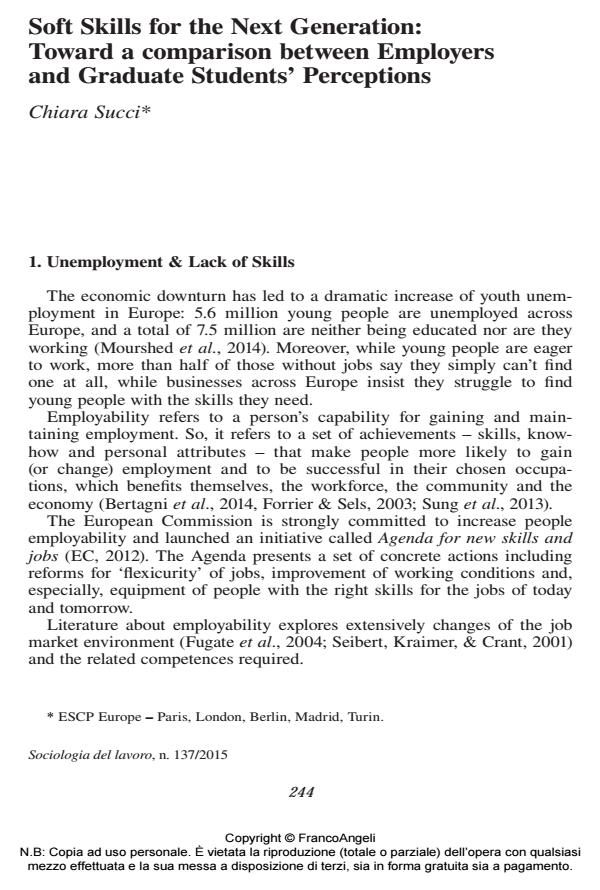Soft Skills for the Next Generation: Toward a comparison between Employers and Graduate Students’ Perceptions
Journal title SOCIOLOGIA DEL LAVORO
Author/s Chiara Succi
Publishing Year 2015 Issue 2015/137
Language English Pages 13 P. 244-256 File size 110 KB
DOI 10.3280/SL2015-137015
DOI is like a bar code for intellectual property: to have more infomation
click here
Below, you can see the article first page
If you want to buy this article in PDF format, you can do it, following the instructions to buy download credits

FrancoAngeli is member of Publishers International Linking Association, Inc (PILA), a not-for-profit association which run the CrossRef service enabling links to and from online scholarly content.
Fast changing environment entails several reflections about skills and attitudes required to face the increasing complexity brought by the "glocal, liquid and networked" world in which workers operate. Considering "declarative knowledge" as a commodity, due to the easier access to content (research engines, online universities, MOOCs, etc.), what does make the difference? Languages and digital literacy are clearly cited as key competences, but a more indistinct need about interpersonal skills and personal characteristics is drawn in the literature. A literature review addressing and structuring this issue is presented in the paper. Based on different studies a list of relevant attributes has been built and a research has been designed. A panel composed by managers of multinational companies and business school graduate students will be asked about new recruitment criteria and first job challenges. Soft skills will be assessed through a survey supported also by qualitative data (i.e. one-to-one interviews and focus groups) and by a comparative analysis. Comparison of data will indicate important areas of action for education institutions, HR managers, and leadership development organizations.
Keywords: Soft skills, interpersonal skills, leadership, transversal competences, employability, next generation
- Soft skills and universal competencies: relationship of concepts, structure and assessment Yulia Borisovna Drobotenko, Natalya Aleksandrovna Nazarova, Irina Leonidovna Smagina, Ekaterina Vladimirovna Panasenko, M.A. Zakharischeva, G.R. Akramova, in SHS Web of Conferences /2021 pp.02003
DOI: 10.1051/shsconf/202112102003 - “T-shaped” lawyer — a new time lawyer? A.V. Averin, O.S. Kulakova, in Voprosy trudovogo prava (Labor law issues) /2021 pp.208
DOI: 10.33920/pol-2-2103-06 - The Importance of Soft Skills in Employability: A Two-Way Perspective Büşra Yılmaz, Bahar Urhan, in Alanya Akademik Bakış /2024 pp.941
DOI: 10.29023/alanyaakademik.1508405 - Leadership Approaches in Global Hospitality and Tourism Bahar Urhan, pp.23 (ISBN:9781668467138)
- Above-professional competencies and their importance O.S. Kulakova, in Voprosy trudovogo prava (Labor law issues) /2021 pp.100
DOI: 10.33920/pol-2-2102-03 - Life-long learning skills as a basis for individual learning style of university students Irina L. Smagina, in Vestnik of Samara State Technical University Psychological and Pedagogical Sciences /2021 pp.19
DOI: 10.17673/vsgtu-pps.2021.3.2
Chiara Succi, Soft Skills for the Next Generation: Toward a comparison between Employers and Graduate Students’ Perceptions in "SOCIOLOGIA DEL LAVORO " 137/2015, pp 244-256, DOI: 10.3280/SL2015-137015